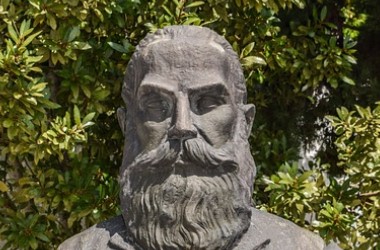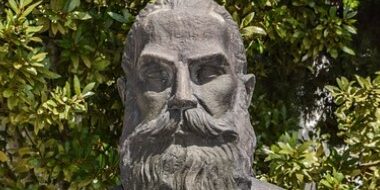DEMOCRITUS – THE LIFE OF AN ANCIENT GREEK PHILOSOPHER

Introduction
Democritus, an esteemed philosopher of Ancient Greece, is highly regarded by contemporary scientists and scholars for his formulation of the most precise early atomic explanation of the cosmos. An eminent pre-Socratic philosopher, he drew inspiration from Leucippus of Miletus and put forth groundbreaking concepts that contradicted the beliefs of Socratic philosophers such as Plato and Aristotle.
What set Democritus apart from his peers was his extensive travel to faraway places in his youth and his exchange of ideas with experts from around the globe. These experiences may account for his rationalism, humanism, and passion for freedom. Due to the loss or fragmentation of much of his work, the precise extent of his expertise may never be fully known. Due to this fact, it is frequently challenging to differentiate his work from that of his mentor Leucippus, whose very existence has been refuted by Epicurus, the philosophical successor of Democritus.
Nevertheless, the ideologies and doctrines he discussed can be traced through numerous citations of his writings by subsequent researchers, indicating that he authored more than seventy books on natural philosophy. Due to the meticulousness of his philosophical concepts, he is widely regarded as the ‘pioneer of contemporary science’.
Democritus’ Formative Years
- Birth and Childhood
Democritus was born during the 80th Olympiad, which took place between 460 and 457 BC. However, there is a belief among certain researchers that his birth may have occurred about 470 BC. There is also an ambiguity regarding his birthplace. Although it is commonly thought that he was born in the city of Abdera in Thrace, some argue that he is actually from Miletus. There is a widely held belief that his father belonged to an affluent aristocratic lineage and had hosted Xerxes during his military campaign through Abdera in the Second Persian War.
With respect to certain stories, the Persian ruler left multiple presents for the people of Abdera, which included a group of Magi. These Magi supposedly instructed him in the fields of astronomy and theology. After the demise of his father, Democritus made the decision to utilize his wealth in the quest for knowledge and wisdom and commenced a voyage to faraway lands. He explored Egypt, Persia, Ethiopia, and several regions of Asia, and is said to have journeyed as far as India.
According to the account of Greek historian Diodorus Siculus, Democritus resided in Egypt for around five years during his visit. He explicitly acknowledged and commended the Egyptian mathematicians for their great expertise in his written works. Given his writings on Babylon and Meroe, it is presumed that he also had firsthand experience in those locations. In addition, it is reported that he had encounters with the Chaldean magi, among whom was Ostanes, who allegedly served as his teacher.
Upon his return to Greece, he persistently embarked on journeys across the country to gain a more profound understanding of its diverse cultures. Throughout this period, he dedicated a substantial portion of his wealth to procuring the literary works of eminent Greek philosophers. By studying these texts, he deepened his understanding of natural philosophy.
The Personal Life of Democritus
Democritus, during his entire life, chose not to marry and instead devoted himself to the examination of several philosophical beliefs. According to several traditions, he is reputed to have lived for more than a century. However, Diodorus Siculus states that he passed away at the age of 90, around 370 BC.
Aside from the twentieth-century historians having recently shown renewed interest in his work due to his meticulous explanation of atoms, he was also highly regarded by the majority of his contemporaries. Nevertheless, Plato, a renowned philosopher from ancient Greece, harbored such strong animosity for him that he expressed a desire for the complete destruction of all his literary works.
RELATED POST: RENOWNED MATHEMATICIANS : 10 GREAT MATHEMATICIANS YOU SHOULD KNOW
A Trajectory of Democritus’ Professional Life
- Interest in Natural Philosophy
After his fortune ran out, Democritus went to his hometown of Abdera, where his brother Damosis provided him with support. To circumvent the legislation of Abdera, which imposed penalties on individuals who squandered their inheritance by denying them proper funeral rituals, he commenced delivering public lectures as a means to garner public support. Due to his extensive understanding of diverse natural phenomena, he achieved accurate forecasts of occurrences such as weather fluctuations, which garnered him widespread recognition among the local populace.
Although Democritus was held in great regard by the general populace, he refrained from engaging in public matters and instead pursued a humble and unassuming lifestyle devoted to his academic pursuits. Democritus was renowned as ‘The Laughing Philosopher’ because of his exceptional sense of humor. His fellow citizens bestowed upon him the moniker ‘The Mocker’ due to his aptitude at ridiculing human foibles.
-
Atomist Doctrine
Democritus is widely known for advancing the concept of atomism, which originated from his ancestor Leucippus. According to this theory, all matter consists of minuscule, indestructible, and indivisible particles known as atoms. Nevertheless, due to the disputed historical legitimacy of Leucippus, many attribute the birth of the theory to Democritus.
The atomists focused primarily on the material and mechanical factors that led to an event, seeking to understand the causes behind its existence. By doing this, they presented a clear and noticeable difference from other well-known Greek philosophers such as Aristotle or Plato, who aimed to elucidate the meaning behind an occurrence. He claimed that the atom is a passive solid that engages in mechanical interactions with other atoms through material connections linked to individual atoms called attachments. In collaboration with his follower Epicurus, he expanded upon the form and dimensions of atoms, asserting that various substances possessed atoms of distinct shapes, and affirmed the perpetual motion of atoms.
In comparison to other prevailing views of the day, the atomist hypothesis exhibits a striking resemblance to contemporary scientific conceptions, albeit more closely aligned with the present notion of ‘molecules’ rather than ‘atoms’. However, instead of being grounded in empirical evidence, it emerged from the observation that since all things inevitably decay and are occasionally regenerated, there must exist those imperishable fundamental constituents of matter that never decay.
The atomistic hypothesis posits that there exists a significant amount of empty space between atoms, referred to as ‘the void’, which enables the continuous movement of atoms. The presence of a void is essential for comprehending the presence of liquid and gas, as they possess the ability to flow and alter their form. Furthermore, the existence of a void elucidates the phenomenon of metals being malleable and capable of being shaped without compromising their inherent properties.
Democritus postulated that the early universe was characterized by a state of disorder, where atoms existed in a chaotic manner. These atoms would then collide with each other, eventually leading to the formation of larger things, such as those observed in our surroundings. He observed the existence of several planets that undergo continuous expansion or deterioration and are susceptible to annihilation in the event of a collision between two such worlds.
- Work in Other Disciplines
Democritus is credited with pioneering the study of aesthetics through his theoretical writings on poetry and the arts, predating the general acceptance of these ideas by scholars like Aristotle. Thrasyllus wrote a minimum of six works on aesthetics as a field of study, but only parts of several of these works have survived, resulting in a lack of knowledge regarding most of his ideas on the subject.
Several prominent scholars from the early period have cited his mathematical writings, such as On Numbers, On Geometrics’, On Tangencies, and On Irrationals. This indicates that he was a trailblazer in the fields of mathematics and geometry. He is renowned for his observation that a cone or pyramid possesses a volume that is precisely one-third of a cylinder or prism, respectively, with equivalent base and height. Through systematic experimentation on natural organisms, he gradually acquired extensive expertise in herbs, plants, and minerals, meticulously documenting his discoveries in numerous written works.
Democritus’ cited works include On the Nature of Man, On Flesh, Causes connected with Seeds and Plants and Fruits, and Causes concerned with Animals. He characterized early people as being similar to animals, devoid of language and any concept of a society. According to his account, once compelled to assemble into groups as a defense mechanism against predators, they subsequently acquired language and knowledge through the process of experimentation and learning from mistakes.
- Perception of Knowledge, Ethics, and Politics
Democritus classified knowledge of truth into two categories: ‘legitimate’ and ‘bastard’, acknowledging the subjectivity of awareness through the senses. He argues that knowledge obtained through the senses is inadequate and so considered ‘illegitimate’, while knowledge received through intellect is deemed ‘legitimate’. Regarding his stance on ethics and politics, he espoused the ancient Greek concept of democracy, advocating for the privileged to assist the underprivileged and exhibit sympathy towards them.
Nevertheless, it is crucial to acknowledge that his concept of equality did not encompass women or slaves, despite his declaration that liberty was superior to enslavement. Although he did not criticize the aspiration to accumulate wealth, he strongly opposed the act of amassing money solely for the benefit of one’s descendants and held contempt for people who acquired money through dishonorable means.
Although Democritus held an aversion to violence, he regarded war or the execution of a criminal or enemy as indispensable. He asserted that kindness necessitated training and self-control, and was not inherently present in human beings. He held the belief that individuals should find satisfaction in their current possessions and avoid coveting what others have. He also said that envy can have detrimental effects on society, as societal progress relies on collective advancement rather than individual desires.
- Notable Achievements
While much of Democritus’ works have only been preserved through citations by later academics, it is widely recognized that he possessed a profound understanding of the natural hierarchy. Many scholars of the twentieth century hold him in high regard due to his innovative views, which were largely devoid of the limitations commonly seen in contemporary Greek philosophy.
His most prominent contribution is in his idea of atomism, which posited the existence of minuscule, imperceptible, and indivisible atoms as the fundamental constituents of all-natural substances. British Historian Bertrand Russell and many other scholars highly appreciated his thoughts for their remarkable alignment with modern scientific principles.
In addition to his concept of atoms, his cosmological theory has also received acclaim from subsequent researchers for its meticulousness. Karl R. Popper had great admiration for his rationalistic philosophy regarding the development of people as social beings. This philosophy states that languages, customs, and laws are institutions created by humans.
YOU CAN ALSO READ ON:
